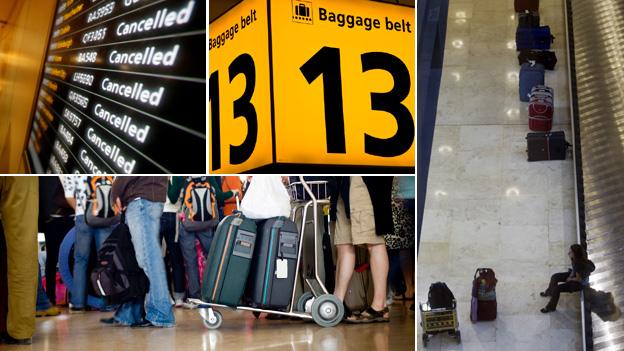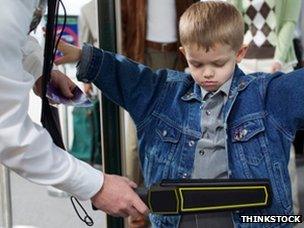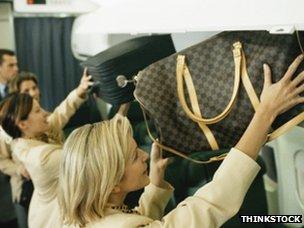Has the airport experience become horrible?
- Published
- comments

Rarely a week passes without passport queue woes in the UK or tales of overzealous security staff in the US. So has going through an airport become a horrible experience?
Airports were once an exciting window to the world.
But with immigration services staff in the UK set to strike and passengers said to have waited for up to three hours for passport checks at Heathrow last week, for some the romance is over.
Across the Atlantic, the American airport experience has also been generating ire.
In April, a man <link> <caption>stripped off</caption> <url href="http://www.huffingtonpost.com/2012/05/03/naked-man-protests-tsa-at-portland-airport_n_1433830.html?ref=travel" platform="highweb"/> </link> in protest of the Transportation Security Administration (TSA) at Portland Airport and the father of a three-year-old boy was so enraged his son was <link> <caption>patted down by an airport screener</caption> <url href="http://edition.cnn.com/2012/03/20/travel/airport-toddler-video/index.html" platform="highweb"/> </link> in Chicago in 2010 he posted a video of the incident on YouTube.

No-one escapes the security check
The rules have changed since then, but earlier this year the <link> <caption>TSA had to apologise to two women in their 80s</caption> <url href="http://www.reuters.com/article/2012/01/19/us-usa-stripsearch-apology-idUSTRE80I29T20120119" platform="highweb"/> </link> after acknowledging agents violated procedures.
There are entire blogs dedicated to a whole array of airport gripes.
Common complaints include confusing signs, chaotic carousel crowding, rampant profiteering, having to remove shoes at security, lack of free wi-fi and lack of information on delays and cancellations.
So has going through an airport really become so terrible it has taken the thrill out of travelling - and if so how did it happen?
Mark Biwwa, 25, an online marketing professional from Malta who has written a blog on the subject, says it is the sheer lack of logic that gets his back up.
"It's things like not being able to take coffee through certain points, but then being able to buy one shortly after. Or magic numbers, like 100ml of liquid, that nobody knows who decides the threshold of," he says.

Some now only travel with hand luggage
Biwwa, who flies about once a month, says even though he loves travelling, he now dreads going to airports.
"I can feel myself getting more tense and irritable around airports, because I know I'm going to get hassled, or told to stick to some ridiculous rules.
"Standing in the line at a security queue reminds me of a slaughterhouse line - it's that kind of atmosphere, where everyone has submitted to being sheep following directives," he says.
Everybody knows that the inconvenience of airport security has been inspired by a very real threat since 9/11. The <link> <caption>latest alleged plot was to detonate an "underwear bomb"</caption> <url href="http://www.bbc.co.uk/news/world-us-canada-17985709" platform="highweb"/> </link> , in an echo of the 2009 plot.
But there are those who feel everything is not being done in as smooth and sympathetic a manner as it could be.
Aviation expert Chris Yates says it is important to differentiate between the immigration delays that have developed in the UK over recent weeks - which he says is primarily a staffing issue - and the much longer-term public perception problem with what he calls the "theatre of security".
"By necessity security has got an awful lot worse over the last 10 years, as controls had to be enhanced after 9/11. But whether the controls put in place in a rush were the best ones, and developed in mind of the public experience - I doubt it," he says.
But Yates argues that instead of "virtually stripping people naked" by taking off their coats, belts and shoes in the security hall, much more automated, technologically advanced ways of screening should be put in place.
These might include putting an explosive-residue and narcotics screening device into a terminal building's front door.
"We need a clean sheet of paper - and to develop the security process in a much more sensible way," he says.
People also feel a sense of injustice when they get caught out by the restrictions, says Bob Atkinson, a travel expert from travelsupermarket.com.
"With the liquid thing, if people get it wrong, they feel annoyed because they've paid for something and lost it. Or if they decide to pay to check in their hand luggage, it can be a £50 charge at the airport - it becomes a hassle and people think why can't it be easy again," he says.
But it's not all about security.
Atkinson argues budget airlines - with their strict policies on baggage size, weight and check-in times - have also been responsible for a shift in attitude and behavioural patterns.
He says the unreserved seating policy that Ryanair and Easyjet operate also often causes frustration.
"You can get to the gate and everyone is sat down, but it takes one person to move and get up, and everyone is up like a flash. I saw that happen in Athens and passengers stood there for 45 minutes - the plane hadn't even arrived yet," he says.
Of course, there are many senses in which the airports themselves are nicer.
BAA says passenger experience at Heathrow has dramatically improved in the past five years, with 70% of passengers now rating it as very good or excellent, compared with 40% in 2006. It says Terminal 5 is consistently rated as one of the best airports in Europe, while plane punctuality and baggage performance have also improved and the average security queue stands at about two or three minutes.
There's loads more to do in airports than there used to be. But the very act of making them like glitzy shopping centres has put a long run of shops and restaurants between you and the departure gate.
The Independent's travel editor Simon Calder argues most airport stress is generally proportionate to the number of people using them at the same time.
"Therefore the Western and Northern Isles of Scotland are blissful, and Heathrow isn't. But it's also a question of attitude and investment: Gatwick South and Heathrow T5 are great facilities now - far better, for example, than the Eurostar rail terminal in Paris, which is an uncomfortable, ill-managed shambles," he says.
Calder says despite all the dissatisfaction, it is important to bear in mind this is the "golden age of flying".
"It certainly isn't glamorous, but goodness it's effective - transporting you safely and economically around Europe and the world, opening up horizons that previous generations can only dream of," he says.